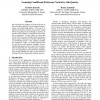Free Online Productivity Tools
i2Speak
i2Symbol
i2OCR
iTex2Img
iWeb2Print
iWeb2Shot
i2Type
iPdf2Split
iPdf2Merge
i2Bopomofo
i2Arabic
i2Style
i2Image
i2PDF
iLatex2Rtf
Sci2ools
118
click to vote
AI
2010
Springer
2010
Springer
Learning conditional preference networks
We investigate the problem of eliciting CP-nets in the well-known model of exact learning with equivalence and membership queries. The goal is to identify a preference ordering with a binary-valued CP-net by guiding the user through a sequence of queries. Each example is a dominance test on some pair of outcomes. In this setting, we show that acyclic CP-nets are not learnable with equivalence queries alone, while they are learnable with the help of membership queries if the supplied examples are restricted to swaps. A similar property holds for tree CP-nets with arbitrary examples. In fact, membership queries allow us to provide attributeefficient algorithms for which the query complexity is only logarithmic in the number of attributes. Such results highlight the utility of this model for eliciting CP-nets in large multi-attribute domains.
Related Content
| Added | 08 Dec 2010 |
| Updated | 08 Dec 2010 |
| Type | Journal |
| Year | 2010 |
| Where | AI |
| Authors | Frédéric Koriche, Bruno Zanuttini |
Comments (0)

